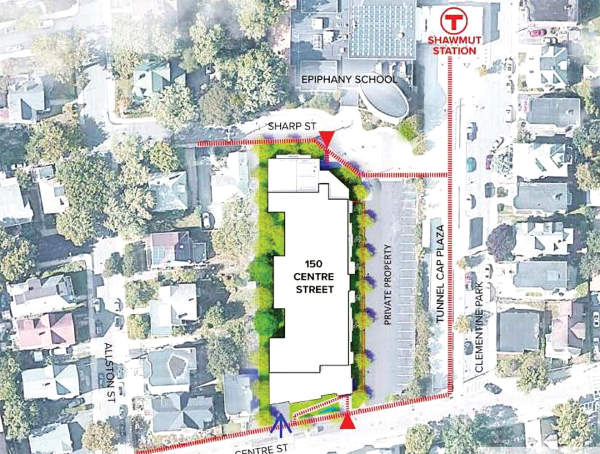March 8, 2023

Another meeting on the 150 Centre St. project is planned after some residents voiced concerns about its impact on traffic and parking in the area. The project calls for 74 units, most of them affordable housing, next to the Shawmut MBTA Station. Rendering via Trinity Financial
The proposal to build 74 residential rental units, roughly 60 percent of them marked for affordable housing, next to the Shawmut MBTA Station drew roughly 130 people to an online meeting last week as city planning and development officials weigh whether to sign off on the project.
The comment period on the project, proposed by developer Trinity Financial for 150 Centre St., closed on March 4.
Some abutters and the developer have clashed over the project for years, with the original proposal calling for 5 stories and 90 units. The building, as currently proposed, would have 4 stories to house 74 units and 39 parking spaces beneath the apartments.
The project calls for 13 studios, 8 of which will have rents set at $700 a month, with the other 5 at market rate; 42 one-bedroom units that will go for $790; and 19 two-bedroom units that will rent for $950 per month.
A traffic study conducted for Trinity Financial “did not find any significant impact on local traffic,” according to the developer’s presentation.
But Michelle Sanchez, principal of the Epiphany School, which is located next to Shawmut Station and had made an unsuccessful attempt to develop the property last year, said she was skeptical. The Fitzpatrick Bros. auto body shop currently on the project site, does not generate much traffic, she said during the March 2 online meeting.
With a 74-unit building, residents are going to need cars, whether they take the train or not, she said. Echoing opponents of the project, Sanchez said the school prefers “family-orientated” housing that offers ownership opportunities, rather than rentals.
Sean Manning, a traffic engineer hired for the Trinity project, said some of the area’s traffic issues stem from people who come into the neighborhood to park for free and take the MBTA. He also noted that on-street parking spaces aren’t regulated through city permits over a quarter-mile radius of the site.
Staffers with the Boston Planning and Development Agency, who moderated the meeting, indicated that another meeting will be held to discuss traffic concerns.
At the March 2 meeting, Cortina Vann appeared on behalf of the Massachusetts Affordable Housing Alliance to voice support for the project. She acknowledged concerns about the traffic but said the project “strikes the right balance.”
Added Hiep Chu, a past president of Fields Corner Civic Association and a developer himself, said he has known Trinity Financial’s Jim Keefe for 30 years and called the 150 Centre St. project “very sensible.”
But local resident Sally Graham said she had major concerns, such as “no pathway to homeownership.” Construction, parking, and traffic issues are being minimized, and the design is “way out of scale” with the surrounding neighborhood, she argued.
Another resident and a longtime opponent of the proposal, Andrew Saxe, pointed to the 2017 fire that hit the Treadmark Building at 1971 Dorchester Ave., which was developed by Trinity Financial. He asked if the Boston Fire Department was involved in reviewing the 150 Centre St. project for fire risks.
Caitlin Coppinger, a BPDA staffer, said Fire Department looks at every project under review by the BPDA, and has input and sign-off.
Bill Richard, who heads up the Martin Richard Foundation and is a vice president at environmental services company, said raising the Treadmark fire is “fear-mongering.” “These guys have a history in the community,” he said of Trinity. “Their properties are carefully designed, constructed, and maintained.”
Wellesley Park resident Domenic Accetta, who has been critical of the project, cited Michelle Wu’s criticism of the city’s development process as mayor and as a mayoral candidate and he noted that the project doesn’t have the support of abutters or the three civic associations in the neighborhood.
“This plan that’s currently being proposed does not come in line with what the mayor campaigned on,” he said.
That prompted Mark McGonagle, deputy director of community engagement for the BPDA, to say that community participation is important as Wu has tasked the agency with focusing on affordability, climate resiliency, and equity. He noted that the Trinity proposal for 150 Centre St. does not displace residents because it replaces an auto body shop, the building will be all-electric with no gas hookups, and has affordable units it aims to add to the city’s housing stock. “It does meet a lot of the goals the mayor has charged us with,” McGonagle said.


